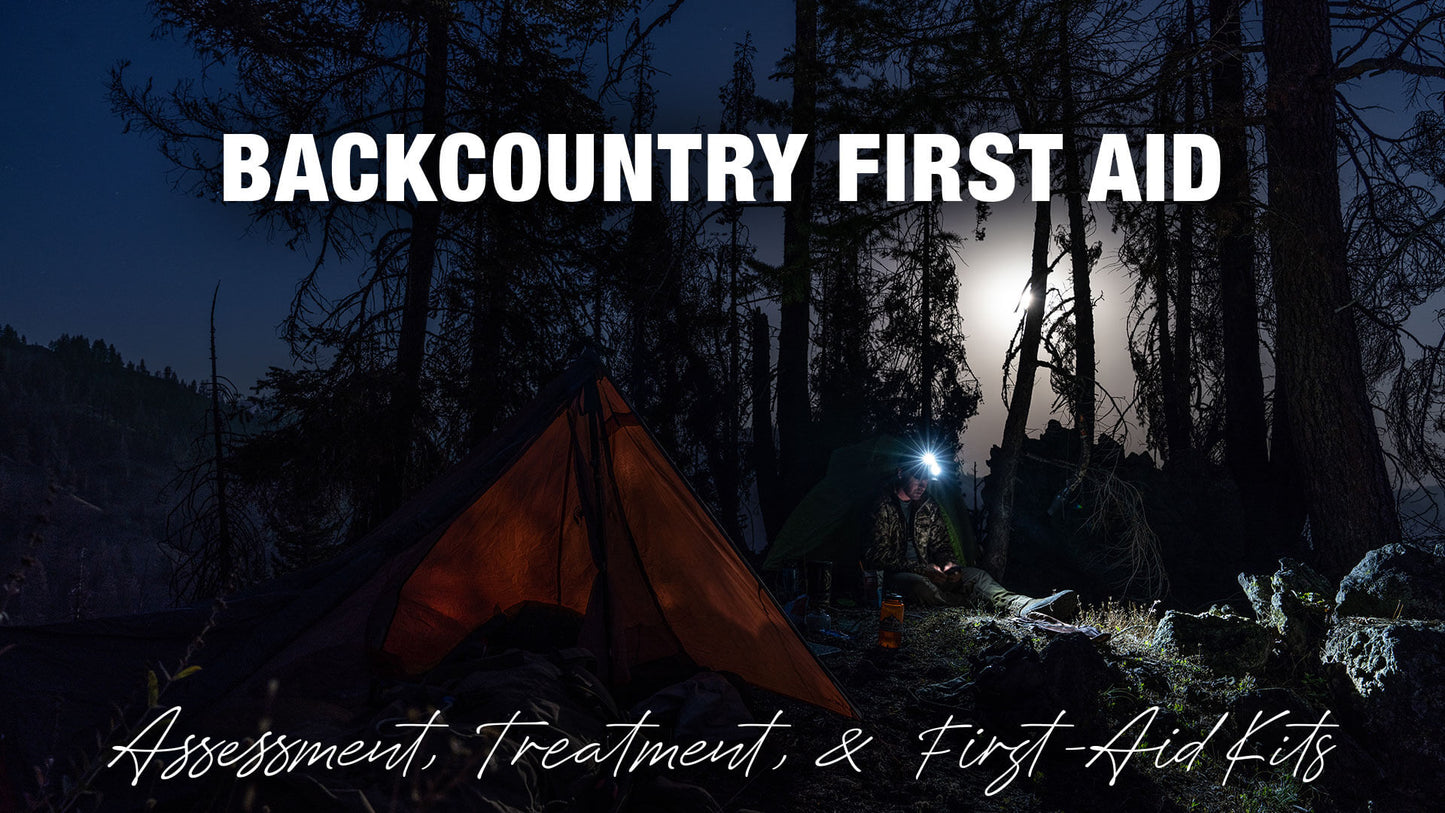
Living in the backcountry can be dangerous — especially for hunters. In addition to hiking in treacherous terrain and encountering difficult weather conditions, backcountry hunters deal with the potential of unintended harm from firearms, broadheads, knives, and more.
As an emergency room physician, trainer of specialized military medics, and a backcountry hunter himself, Dr. Jesse Mix has the education, training, and first-hand experience to help backcountry hunters prepare for the medical-related risks associated with pursuing wild game in wild places.
Jesse joins Mark & Steve on the Hunt Backcountry Podcast to discuss the mnemonic "MARCH PAWS", which is used by Air Force Special Operations Pararescuemen (PJs), to assess and treat the majority of all battlefield and non-battlefield injuries.
M = Massive Bleeding
A = Airway
R = Respirations (Breathing)
C = Circulation
H = Head & Hypothermia
P = Pain
A = Antibiotics
W = Wounds
S = Splint
As discussed in the podcast (above), Jesse created a quick reference guide for hunters to carry in their packs, along with their first aid kit. This quick reference guide will not only outline the MARCH PAWS mnemonic, it will provide helpful information for in-the-field assessment and treatment…
MARCH-PAWS Quick Reference (PDF)
A Backcountry Hunter's First Aid Kit
There is no such thing as the "perfect" first aid kit. When assembling a first aid kit, it is important to consider factors such as…
- How long you will be out
- How many people will it need to cover
- Your level of medical knowledge/skill
- Health issues of you/your partners
- What other gear your partner is bringing
With Jesse's military background and training, he emphasized that every military member going into combat carries an Individual First Aid Kit (IFAK) which covers MAR in MARCH, and a Combat Pill Pack which covers PA in PAWS:
For M (Massive Bleeding), there is a tourniquet, hemostatic (aka combat) gauze, normal gauze, and elastic wrap. For A (Airway) there is a Nasopharyngeal airway (NPA). For R (Respirations/Breathing) there is a vented chest seal and nitrile gloves. The Combat Pill Pack contains meloxicam and acetaminophen for P (pain) and moxifloxacin for A (Antibiotics).
A comprehensive, self-built MARCH/PAWS-focused first-aid or medical kit for non-medical folks might contain:
- MARCH — M: tourniquet, combat gauze, normal gauze, elastic wrap, A: CPR breathing barrier mask, Nasopharyngeal airway (NPA), R: vented chest seal, C: electrolyte solution/water, H: a space blanket, hand warmers, winter hat (to add to your other clothes/sleeping bag/etc). Also keep in mind that many of the MARCH treatments are knowledge or skill-based and don't require a certain piece of gear, such as knowing how to position the Airway.
- PAWS — P: ibuprofen/acetaminophen, A: oral antibiotics (all prescription) and topical triple antibiotic ointment, W: Soap, alcohol wipes, Butterfly suture or Steri-strips, super glue, S: a padded aluminum splint (ie SAM splint) and cloth or duct tape
- Additional OTC (over the counter) Medications — Benadryl (and Epipen if history of severe allergic reaction), loratadine (non-drowsy non-emergent allergic symptoms), pseudafed (congestion), loperamide (anti-diarrhea), docusate (constipation), Tums (heartburn), pepto-bismol/bismuth tabs (upset stomach), meclizine (nausea/motion sickness), and aspirin 324mg (heart attack). Additionally, make sure to pack any medications that you and/or your hunting partners use regularly.
- Other Essentials — nitrile gloves, cloth tape, blister kit (usually moleskin), bandaids and/or non-stick gauze pads, sunscreen, chapstick, bug spray, whistle
- Communication & Evacuation — a satellite messenger (inReach/Zoleo/other) and a written travel plans and estimated timeline left with a person at home
An abbreviated version of a first aid kit that may be better for a less-remote and shorter-duration trip (assuming quick evac times and not planning on being gone for more than a few hours or a day) might contain:
- MARCH — M: combat gauze, A: positioning knowledge only, R: vented chest seal, C: electrolyte solution, H: space blanket or plastic poncho
- PAWS — P: ibuprofen/acetaminophen, A: defer, W: alcohol wipes, super glue, S: tape
- Additional OTC Medications — Benadryl (and Epipen if history of severe allergic reaction), aspirin 324mg (heart attack) and whatever meds you use regularly.
- Essentials — bandaids, sunscreen, chapstick, whistle, and Satellite messenger
Please remember that what you have is only as valuable as what you know, and "Knowledge weighs nothing in a ruck."
This information is shared as informational reference only and should not be taken as professional medical advice.
